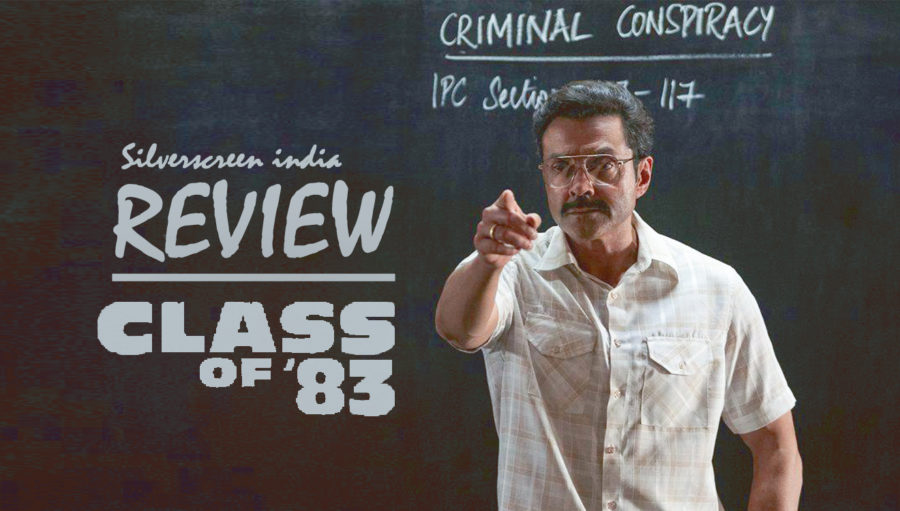Director: Atul Sabharwal
Cast: Bobby Deol, Bhupendra Jadawat, Ninad Mahajani, Hitesh Bhojraj
First up, it is disconcerting to see Bobby Deol as a father of a college student. The pandemic may have stretched 2020 to feel like a decade but it sure has seen to it that we 90s kids took cognizance of our age. And then we see him holding a baby. No, it’s not a flashback but the film’s original timeline, police officer Vijay Singh is now a grandfather.
Just how many times is this film (a Netflix original) set in the 80s titled – duh – Class of ’83 planning to toy with us? Quite a few times, evidently. At one point, Vijay Singh unironically says in as many words – “Institutionalized killing of gangsters by policemen” – that is his life’s mission. Or his second wind.
The film, directed by Atul Sabharwal, written by Abhijeet Shirish Deshpande and adapted from Hussain Zaidi’s book of the same name, is unabashed in its endorsement of extrajudicial killings, murders of gangsters and their henchmen. The scene where Singh utters those lines is shot in an educational institution where he and his colleague are on a seesaw, with Singh comparing their warring ideas with the beam balance held by Lady Justice.
Class of ‘83 does throw in a few glances at human rights inquiries and furores in the parliament, it even has the police academy instructors and professors teaching mentioning the law prohibiting Singh’s vision and minute details like what not to do with a gun, but apart from that it is just a bland narration of the seeds that were sown in 80s Mumbai that would unleash a maelstrom in the 90s and 00s, both in real life and as a sub-genre in Indian cinema.
Sabharwal initially tries to marry the film to its natural masala milieu, building up the mythical Vijay Singh who is the new dean at Nashik’s police academy but rarely encountered by the students. Deol gets an appropriate introduction, breaking bones in a matter of seconds in the darkness.
The film is bathed in muted, washed colours and sometimes goes sepia with grainy archive footage of 80s Bombay. The gangsters names have probably been changed for the film, and the film’s tones follow suit, it turns into a pale shadow of its brooding anchor – Vijay Singh – who was married to his work and his wife, losing the latter due to an undisclosed health issue while on an unsuccessful mission.
He confesses that he’s attempted suicide twice, once after her death and another time during his “punishment posting” to the academy. The man needs help more than a punishment posting but that’s a different film. He chooses four to five underperforming students based on a code that remains unclear, so he just goes with the gut that they’d be able to accomplish what he couldn’t – the institutionalized murders.
Bhupendra Jadawat as Shukla, Ninad Mahajani as Jadhav, Hitesh Bhojraj as Varde are the three main students and Sameer Paranjape’s Aslam Khan becomes the good Muslim narrator.
Recommended
With its disturbing romanticizing, the least Class of ’83 could have done is use the era as a tool to expand its universe, throw some light on the political and social situation in Mumbai and India of the 80s. We get mentions of Indira Gandhi’s corrupt government and the efforts to curb the separatist movement in Punjab, the closing of Mumbai’s textile mills and the booming real estate but Sabharwal is more interested in the firing of the gun and an uninteresting mention of a politician-gangster nexus.
All of this is filmed as if in monosyllables that add nothing important to the film, it is still an unimaginative montage of what the 80s era cops did to accrue informants and follow the trail of gangsters. The filmmakers surely wanted to dial up the testosterone levels with this one, I lost count of the number of times masturbation was mentioned.
The Class of ’83 review is a Silverscreen India original article. It was not paid for or commissioned by anyone associated with the film. Silverscreenindia.com and its writers do not have any commercial relationship with movies that are reviewed on the site.



